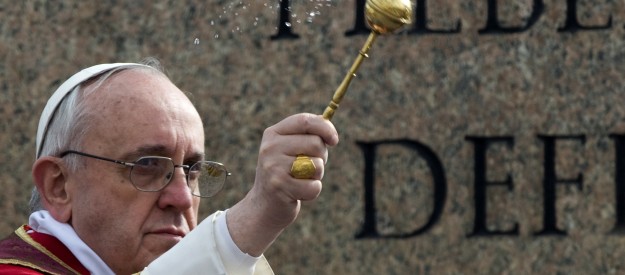"We are losing our attitude of wonder, of contemplation, of listening to creation and thus we no longer manage to interpret within it what Benedict XVI calls 'the rhythm of the love-story between God and man.'"
+ Pope Francis
Pope Francis and the sins of the world

Environmentalists and many mainstream news outlets were delighted this weekend when Pope Francis spoke about sin and ecological destruction.
Of course, what the pope said shouldn’t come as a surprise—Saint John Paul II, Benedict XVI, and others have made similar statements. What surprised me was not the spirited insights of Francis but how readily the concept of sin has (apparently) been accepted by those who normally shudder at the mention of it. This is not a rebuke of secular environmentalists and journalists. It is a hope for dialogue.
The pope made his comments during a pastoral visit to a depressed area of southern Italy. Here’s what he said:
This is one of the greatest challenges of our time: conversion to a development that respects Creation. In America, my homeland, I see many forests, which have been stripped ... that becomes land that cannot be cultivated, that cannot give life. This is our sin: we exploit the earth and do not let it give us what it harbors within, with the help of our cultivation.
Pope Francis also used his visit to remind us about how work is necessary not just for our physical needs, but for our self-worth.
I would like to return to a word that you said: dignity. Not having work not only means not having the necessities of life: no. We can eat every day: we can go to Caritas [a Vatican-run charitable organization], to this association or to that club, where they will give us something to eat. But that's not the problem. The problem is not being able to bring the bread home: this is serious, and this robs people of dignity! This takes away their dignity. And the biggest problem is not hunger …The most serious problem is dignity. For this we have to work and defend that dignity that work gives us.
The pontiff also spoke of motherhood, family, economics, and other human realities. That the pontiff could blend so many themes into one talk is because, as Benedict XVI put it,
The book of nature is one and indivisible: it takes in not only the environment but also life, sexuality, marriage, the family, social relations: in a word, integral human development. Our duties towards the environment are linked to our duties towards the human person, considered in himself and in relation to others. It would be wrong to uphold one set of duties while trampling on the other. Herein lies a grave contradiction in our mentality and practice today: one which demeans the person, disrupts the environment and damages society. [Caritas in Veritate, §51]
What Benedict XVI is reminding us here is that all this demeaning, disruption, and damage are all the effects of sin. And we need to acknowledge our faults—our lesser and our most grievous faults—if we are to confront them and seek their resolution.
It is good, then, that the media is reporting (and in some cases celebrating) Pope Francis's words about sin—even if the same journalists are selective as to when they spotlight sin. But this selectivity gets us to the “grave contradiction” that Benedict XVI has warned us about. And now that we are there, we should make the most of it.
That is, there is an opportunity bring the light of faith wherever there is an inability of worldly ideologies or political parties to fully embrace what the Church teaches about humanity, and what the Church teaches us about our relation with each other and the world around us. Drawing attention to the problems generated by such ideological contradictions is His Excellency, Bishop Daniel E. Flores of Brownsville, Texas. In a recent post in his episcopal blog, he writes,
Let Catholics first tell the friends and power-brokers that we may know in both parties that the space they leave us is too narrow and the choices too cruel. Let Catholics in the Democratic Party make it known that in their tent there must be room to defend the unborn child, and that the arc protecting the vulnerable cannot cut them off from those we must work to protect. And let Catholics in the Republican Party make it known that in their tent there must be room to defend the immigrant, and that the arc defending the vulnerable cannot cut them off from those we must work to defend.
While Bishop Flores did not mention ecology, the topic fits precisely within his post. Ecology is, after all, a topic embraced by political ideologies that can often encourage abortion, euthanasia, and artificial birth control. And it is a topic that is often disavowed by ideologies that understand the Church's position on those issues but that disregard her teachings on other issues, such as economics or caring for immigrants.
Thus for Catholic ecologists, calling attention to the sin of ecological destruction is not an end unto itself. It must be the start of a wider conversation. It must lead us to discussions about what sin is, how pervasive it is in all our lives, and how often we think that it is only something suffered by those who do not possess our worldly ideologies.
The two great opportunities that Catholic ecologists have right now, then, is to share with a great many what we mean when we use the word sin, and to then share what is needed—that is, Who is needed—to takes away the sins of the world.
Photo: Flicker/ MATEUS_27:24&25


















